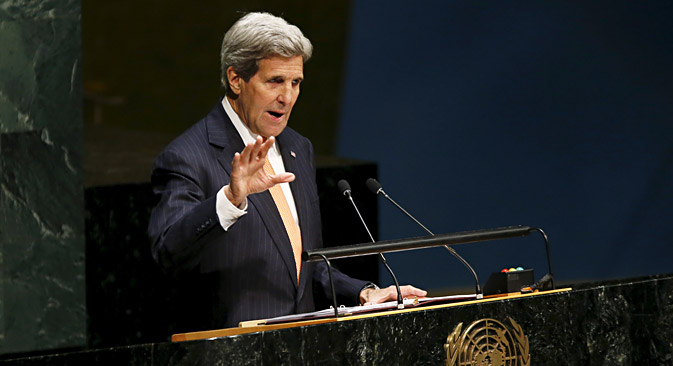
U.S. Secretary of State John Kerry addresses the Opening Meeting of the 2015 Review Conference of the Parties to the Treaty on the Non-Proliferation of Nuclear Weapons at UN headquarters in New York, April 27. Source: Reuters
Speaking at the opening of the Nuclear Non-Proliferation Treaty Review Conference (NPT) in New York on April 27, U.S. Secretary of State John Kerry denounced what he labeled a "clear violation" by Moscow of the Intermediate-Range Nuclear Forces Treaty, urged Russia to further reduce its nuclear arsenal and criticized the Russian Federation for disregarding the 1994 Budapest Memorandum, in which Moscow guaranteed the inviolability of Ukraine’s borders in return for Kiev giving up its nuclear stockpile.
Kerry expressed concern about Russia's alleged violation of its obligations under the INF Treaty, but failed to provide evidence. Speaking in New York, director of the Russian Foreign Ministry department for non-proliferation and arms control, Mikhail Ulyanov, dismissed Kerry's remarks as "unfounded accusations," which the U.S. "refuses or, most likely, fails to back up with concrete facts."
The Russian diplomat said that "it is the policy of the U.S. that is the most serious obstacle to further nuclear reductions." In particular, Ulyanov mentioned the U.S. concept of the “prompt global strike,” its unilateral deployment of a missile defense system and its opposition to opening negotiations to ban the deployment of weapons in space.
Dmitry Yevstafyev, a professor of the Higher School of Economics in Moscow and an expert on nuclear non-proliferation, told RBTH that there is no evidence of violation of the INF by Russia. "This is only a rumor, which is based on the interpretation of certain kinds of scientific research that take place in the Russian Federation," he said.
Pyotr Topychkanov, coordinator of the Carnegie Moscow Center's nonproliferation program, noted that the INF Treaty provides mechanisms that allow the parties to discuss emerging concerns, but the U.S. has not made use of them. Topychkanov also pointed out that Washington is not trying to solve the existing problems on a bilateral basis, but actively promotes the topic in the media and airs it on multilateral platforms.
In his speech, Kerry touched upon the Strategic Arms Reduction Treaty (START III), which was signed a few years ago. He said that the agreement is being executed by both parties, but stressed that Washington continues to urge Moscow to further reduce its nuclear stockpile by 30 percent.
According to Yevstafyev, Russia is not yet ready to make a further reduction of its nuclear potential. The reduction of strategic nuclear forces below the ceilings set by START III will mean giving the U.S. an "undoubted advantage" in the delivery of conventional weapons, such as cruise missiles.
Topychkanov pointed out that START III is now being executed by both parties "100 percent" and made it clear that Kerry's calls are premature, since the agreement will still be in effect until 2020. The expert also noted that Russia has no reason to fall below the limits set by START III.
Commenting on Kerry's remarks about Russia's disregard for the Budapest Memorandum (on security assurances to Ukraine in connection with its accession to the NPT), Topychkanov said that "what happened in Ukraine [Russia’s takeover of Crimea] sent the wrong message to countries that are contemplating acquiring nuclear weapons," which saw Ukraine give up its nuclear weapons and then lose part of its territory.
Yevstafyev claims that when the Budapest Memorandum was signed, Moscow proceeded on the basis that Ukraine would pursue a neutral status, but recently Ukrainian leaders have taken the path toward NATO membership. "From the perspective of the political factors set forth in the memorandum, Ukraine itself has gone beyond the memorandum [by expressing its desire to join NATO]," said Yevstafyev.
All rights reserved by Rossiyskaya Gazeta.
Subscribe
to our newsletter!
Get the week's best stories straight to your inbox